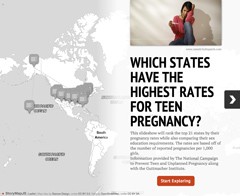Cronkite News has moved to a new home at cronkitenews.azpbs.org. Use this site to search archives from 2011 to May 2015. You can search the new site for current stories.
Advocates call for state to expand participation in sex education
Teen pregnancy in Arizona is a story of improvement and opportunity, advocates and experts say.
The improvement: Between 2007 and 2013, Arizona’s teen birthrate dropped from 59.6 per 1,000 births to 33.1 per 1,000 births, according to the Centers for Disease Control and Prevention. That decline was one of the steepest in the nation.
The opportunity: That 2013 rate was well above the national average of 26.5 per 1,000 births, and Arizona ranked ahead of just 10 states.
Laura Pedersen, founder of Teen Outreach Arizona, says one way the state can improve is changing the way it handles sex education, which at present isn’t required in schools, must focus on abstinence if it’s offered and is only provided to students whose parents sign a permission slip.
“We need to pass some laws at the state level to have age-appropriate comprehensive sex ed in the schools,” Pedersen said. “I mean, we can’t mandate for parents to teach their kids this stuff.”
Rep. Juan Mendez, D-Tempe, authored a bill during the recent legislative session that would change the system form opt-in to opt-out, saying it would allow more students to receive sex education. The bill wasn’t heard in committee.
“I think it’s really irresponsible that we let so many youth go out into the world without proper sex education, without a proper understanding of what they’re getting themselves into,” Mendez said. “Right now we’re putting all those students at a disadvantage.”
A 2008 study published in the Journal of Adolescent Health in 2008 concluded that adolescents who received comprehensive sex education had a lower risk of pregnancy than adolescents who received abstinence-only or no sex education.
While Arizona’s statistics have improved overall, Pedersen noted that rural counties continue to have a bigger challenge when it comes to teenage pregnancy.
According to the Arizona Department of Health Services, Gila, Graham, Greenlee, La Paz and Yuma counties had much higher rates of pregnancy among those 19 and younger than the state average 19.2 per 1,000 females.
Rebekah Garcia, program coordinator for AZ Youth Partnership, which provides education in rural areas of Pima and Santa Cruz counties on various subjects, said some schools turn down the offer of help with sex education.
“It’s based on what the community wants,” Garcia said. “We don’t really go where nobody wants us to be teaching. A lot of the rural communities are very conservative, so that’s kind of what they want for their students.”
Diana Rhodes, director of public policy at Washington, D.C.-based Advocates for Youth, said a comprehensive sex education program in Arizona would help reduce the incidence of sexually transmitted disease.
“Some positive outcomes of comprehensive sex education is preventing unintended teen pregnancies, preventing an increase of sexually transmitted infections and preventing an increase in sexually transmitted diseases,” she said.
Christopher Scott, a human sexuality professor at Arizona State University, said he’d like to see a new sex-education system that includes parents because they can have a huge impact on their children’s decisions about sex.
“Even if parents don’t talk to their children, they can still have an effect on their behavior,” Scott said. “This is through their own behavior and their actions because they are still providing a role model for their children.”
Pedersen agreed that the role of parents is important but said that doesn’t always happen.
“If they’re not going to do it, then they need to let the schools do it,” she said.
Infographic by Lauren Loftus
Infographic by Lauren Loftus
Data from Arizona Department of Health Services, visualization by Lauren Loftus









